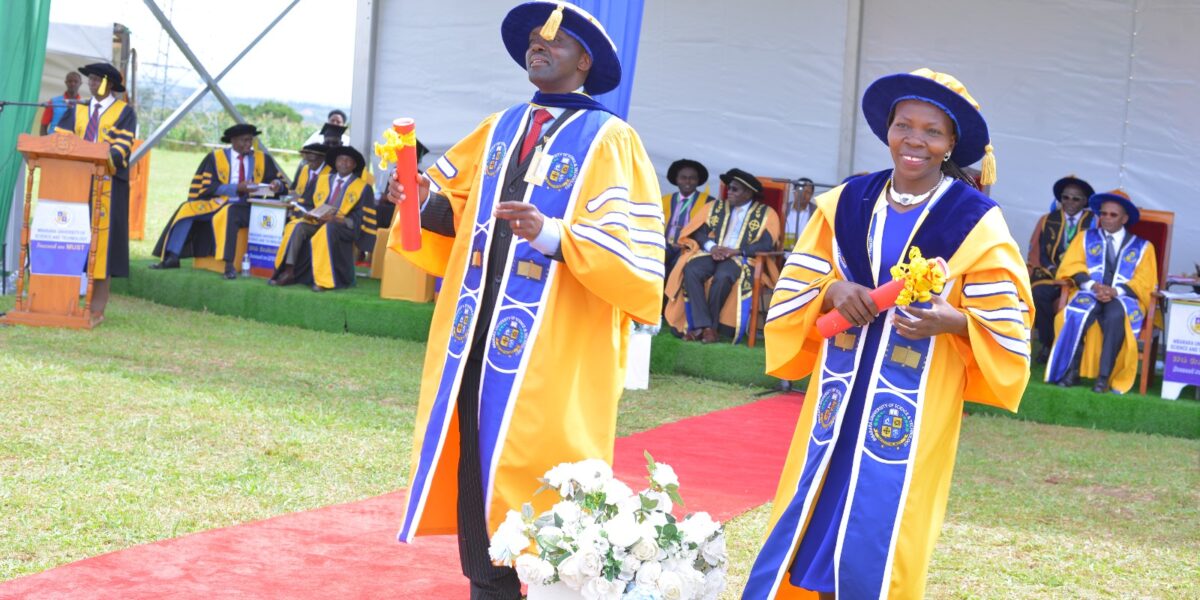During the 29th graduation ceremony of Mbarara University of Science and Technology, 26 candidates were conferred the Degree of Doctor of Philosophy of Mbarara University of Science and Technology.
The Faculty of Medicine
Tadele Mekuriya Yadesa
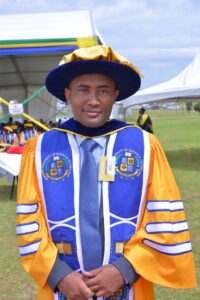
Topic: Incidence, risk factors and risk prediction of adverse drug reactions among older inpatients at Mbarara Regional Referral Hospital, Southwest Uganda
Details: The current prevalence of HA-ADR is higher than what has been previously documented. The majority of the ADRs were preventable. Disease-related factors followed by medication-related factors were shown to be the most important predictors of HA-ADRs. Thus, we recommend larger and multi-centered cohorts of older adults to be undertaken.
Supervisors:
- Associate Professor Paul Alele from Department of Pharmacology at Mbarara University of Science and Technology
- Associate Professor Robert Tamkong from Department of Pharmacy at Mbarara University of Science and Technology
- Freddy Erick Kitutu, School of Pharmacy, College of Health Sciences, Makerere University
applying PADROI model.
He was Funded by : PHARMBIOTRAC
Nakaziba Rebecca
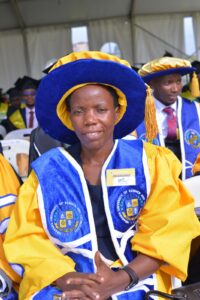
Topic: Antimicrobial and Anti-hyperglycaemic activity of Corchorus olitorius L
Details: Corchorus olitorius is traditionally used to treat joint and bone-related ailments. It is bioactive against bacteria and a moderate anti-hyperglycaemic agent with no toxic effects. Further pharmacological investigations and possible pharmaceutical development should be considered.
Supervisors:
- Associate Professor Paul Alele from the Department of Pharmacology at Mbarara University of Science and Technology
- Professor Jasper W Ogwal-Okeng from Lira University
Funding: Lira University
Ronald Bahati
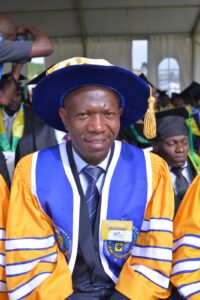
Topic: Stigma, Depression, and Substance Use among African Urban Refugees Living in Mbarara City, South-western Uganda
Details: Urban refugees in Uganda experience high prevalence of stigma, depression, alcohol and other substance use. Depression and substance use among urban refugees are moderated by other confounding variables especially age, education level, and economic status paired with stigma. Society perceived refugees with a lot of contempt and suspicions, although the community appreciated the acceleration of the substance consumer market especially of food stuffs and housing services brought about by the presence of refugees in Mbarara city.
Supervisors:
- Cathy Denise Sigmund from the School of Psychology and Social Sciences at Geneva College
- Godfrey Rukundo from the Department of Psychiatry at Mbarara University of Science and Technology
- Herbert Elvis Ainamani from the Department of Psychiatry at Kabale University
Funding: Self-sponsored
Hedmon Okella
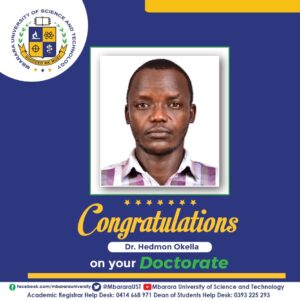
Topic: Screening and Characterization of antimicrobial peptides from fish mucus in three major lakes of Uganda
Details: Antimicrobial peptides (AMPs) constitute a broad range of bioactive compounds in diverse organisms, including fish. Currently, several peptide antibiotics have been approved for clinical use. Still, skin mucosal AMPs of African catfish and African lungfish are largely unexplored despite their potential in contributing novel drug candidates. Accordingly, the African Catfish Antimicrobial peptides (ACAPs) were investigated. Collectively, the 7 African catfish antimicrobial peptides were identified as potential novel drug candidates. Future research is recommended to validate their activity in vivo on a wider range of bacteria.
Supervisors:
- Associate Professor Ogwang Patrick Engeu from the Department of Pharmacy at Mbarara University of Science and Technology
- Kato Charles Drago from the College of Veterinary Medicine, Animal Resources and Bio-security(COVAB)
Funded by: PHARMBIOTRAC
Kansiime Rachel
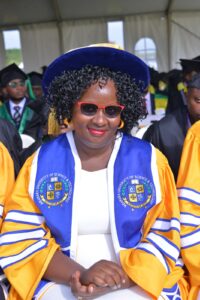
Topic: Intra-psychic factors, coping skills, psychological well-being, and caregiving satisfaction among caregivers of patients with cancer at the Uganda Cancer Institute and Mbarara Regional Referral Hospital
Details: The results of this study showed that personality, hardiness, and coping significantly had an association with the psychological well-being of cancer caregivers and significantly had an association with caregiving satisfaction for the functional cancer caregiver. It is therefore recommended that coping and hardiness training programs coupled with psychological support sessions be provided for cancer caregivers. This will offer increased enrichment and support and reduce the psychological distress among cancer caregivers hence enhancing their mental health.
Supervisors:
- Godfrey Rukundo from the Department of Psychiatry at Mbarara University of Science and Technology
- Simon Kizito from the School of Psychology, Makerere University
- Milton Mutto from the Pincer Group International (PGI)
Funded by : The East African Centre of Excellence in Oncology at the Uganda Cancer Institute with funding from the African Development Bank (ADB)
Hamson Kanyesigye
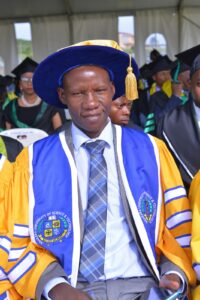
Topic: Assessment of the Challenges of Intrapartum Referrals and use of Mobile Phone Technology to Improve Maternal-Fetal Outcomes in South Western Uganda
Details: Most of the intrapartum referrals had poor social-economic status, used taxis, and lacked professional escort. Health workers suffered harassment, lack of communication, and a shortage of supplies. The phone call intervention was acceptable by HCWs, it reduced delay to patient admission at MRRH and was protective against adverse maternal-fetal outcomes. We recommend incorporating the phone call communication intervention in the routine practice of managing emergency maternal referrals.
Supervisors:
- Joseph Ngonzi from the Department of Obstetrics and Gynecology at Mbarara University of Science and Technology
- Professor Jerome Kabakyenga from the Department of Community Health and IMNCH
Funded by: Mbarara University and Healthy Child Uganda Micro-Research Program
Atuhaire Catherine

Topic: Postpartum Depression in South-western Uganda: Associated factors, lived experiences of mothers who recovered from a clinical diagnosis and validation of a screening tool
Details: The prevalence of PPD in the Mbarara and Rwampara districts is higher than what has previously been reported in Uganda, indicating an urgent need to identify pregnant women who are at increased risk of PPD to mitigate their risk or implement therapies to manage the condition.
Midwives who attend to these mothers need to be empowered with available methods of mitigating the prevalence and consequences of PPD. Suicidal and homicidal thoughts are important parts of the postpartum depression experience, and these may put the lives of the mothers, their spouses, and their babies at great risk.
Poor relationship quality, intimate partner violence, and lack of financial resources contribute significantly to the negative emotional experiences of mothers with PPD. The EPDS is a valid screening tool if used at a cut-off score of ≥10 in southwestern Uganda. It has a good diagnostic performance to correctly detect PPD among postpartum mothers.
Supervisors:
- Grace Nambozi from the Department of Nursing at Mbarara University of Science and Technology
- Godfrey Rukundo from the Department of Psychiatry at Mbarara University of Science and Technology
- Laura Brennaman
Funded by: The East African Centre of Excellence in Oncology at the Uganda Cancer Institute with funding from the African Development Bank (ADB)
Faculty of Science
ANDAMA Geoffrey
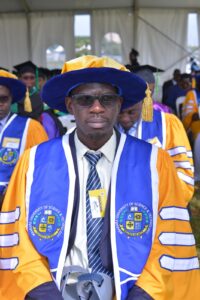
Topic: “On planet formation by multi-species pebble accretion”
Supervisors: He was supervised by;
- Associate Professor Jurua Edward (MUST),
- Ndugu Nelson (Muni University)
- Prof. Anguma Simon Katrini (Muni University)
Funding: International Space Programmer, Sweden (ISP).
EGOR Moses
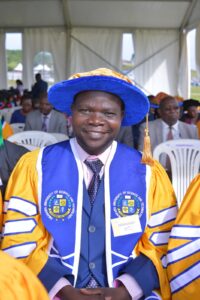
Topic: “Cellulose-Bimetal Nanocomposite Adsorbent for Defluoridation of Groundwater from Sukulu Hills, Uganda”
Supervisors;
- Emmanuel Ntambi (MUST)
- Samson Rwahwire (Busitema University)
- Thalappil Pradeep (Indian Institute of Technology, Madras)
Funding: Funded by DAAD
MAATE Clive
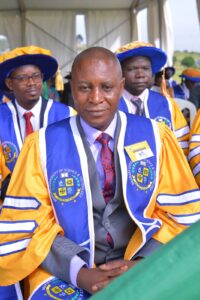
Topic: “Teaching-Learning Facilities and Students’ Performance in chemistry in Selected Secondary Schools in Kasese Municipality”
Supervisor;
Associate Professor Adrian Mwesigye (MUST).
Funding: He was self-sponsored.
MUGUMYA Duncans
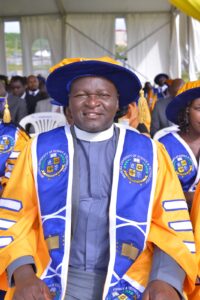
Topic: Mugumya’s research addressed “Parental Engagement and Students’ Academic
Performance in Government Grant-Aided Universal Secondary Education Schools in Sheema District, South–Western Uganda”
Supervisors;
- Prof. Adrian Mwesigye – PhD (MUST)
- Emmanuel Karoro – PhD (Mak)
Sponsor: He was self-sponsored
MWESIGWA Ronald
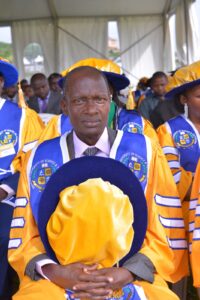
Topic: “Analysis of the Payne – Whitham Trafic Flow Model
using the Finite and Boundary Element Methods”
Supervisors;
- Everest Nabassa (MUST)
- John Obongoloch (MUST)
Sponsor: He was sponsored ADB – HEIST support to MUST
NUWAGABA James
Topic: “Entry Scores, Study Habits and Academic Performance of Students in Primary Teachers’ Colleges in South Western Uganda”
Supervisors;
Prof. Adrian Mwesigye – PhD (MUST)
Sponsor: He was self-sponsored
NGABIRANO Hannington
Topic: “Pesticides in Vegetable Growing – A Case Study of Pesticide Use and Their Residues in Vegetables in Kabale District, Uganda”
Supervisors;
Prof. Grace Birungi (MUST)
Funding:
Sponsor: He was self-sponsored
ORYEMA Bosco
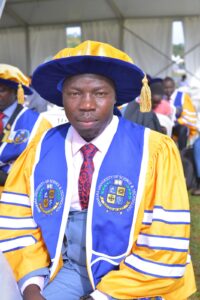
Topic: Oryema’s research “Deep-space radiation effects on fluorine-doped SnO2 thin films for spacecraft passive thermal control coating application”
Supervisors;
- Prof. Edward Jurua (MUST)
- Malik Maaza (iThemba Labs, South Africa) and
- Itani G. Madiba (iThemba Labs, South Africa)
Funding; The Swedish International Development Co-operation Agency (SIDA) through the International Space Programme (ISP) of Uppsala University, Sweden.
OJOK Walter
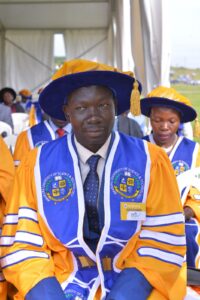
Topic: Ojok’s research addressed the “Mesoporous Sorbents from Biowaste for Sustainable Fluoride Removal from Water”
Supervisors:
- Emmanuel Ntambi (MUST),
- Wasswa John (Makerere University)
- William Wanasolo (Kyambogo University)
- Brenda Moodley (University of Kwazulu Natala)
- James Bolender (University of Sandiago USA)
Funding: DAAD (Germany Exchange Programme). Part of the Research funds was also supported by the African Germany Network of Excellence in Science (AGNES)
Faculty of Interdisciplinary Studies
Ms. Speciouza Birungi
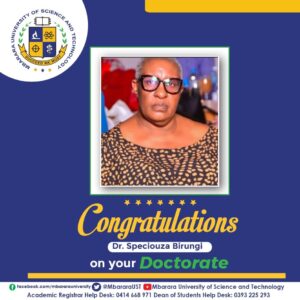
Topic: Perceived Organizational Behaviour And Performance Of Academic Staff At Bishop Stuart University
Supervisors
- Assoc.Prof. Charles Tushabomwe Kazooba
- Assoc. Prof. Fr. Adrian Mwesigye
Funding: Self sponsored
Ms. Ruth Kaziga Kamugungunu

Topic: Young Adult Banyankore Girls Response To Social Construction Of Body Image In The Ankore Region, Uganda
Supervisors:
- Dr. Charles Muchunguzi
- Dr. Suzan Kools, University of Virginia
Funding: Self sponsorship
Ms. Jennifer Turyatemba Tumushabe
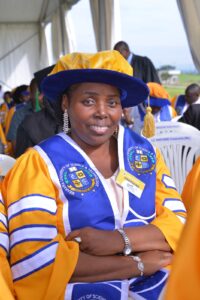
Topic: Exotic Tree Growing And Livelihoods Among Rural Communities Of Kigezi Sub Region, South Western Uganda
Supervisors:
- Dr. Rogers Bariyo
2. Dr. Ronald Twongyirwe
Funding: Self sponsorship
Ms. Wendo Mlahagwa
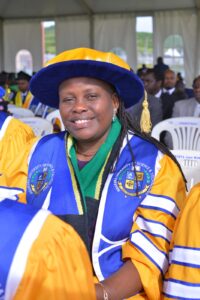
Topic: Captivity And Post Captivity Experiences Of Formerly Abducted Young Mothers And Their Social Reintegration In Post Conflict Northern Uganda:
Supervisor: Prof. Roberts K. Muriisa
Funding: DAAD
Faculty of Computing and Informatics
Aggrey Obbo
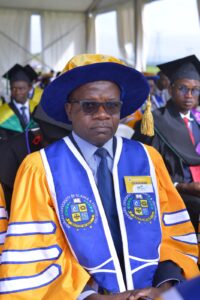
In the thesis titled “Algorithms for Detection of People Crowds”, the main objective of the research was to develop algorithms to be implemented for the detection of people crowds that are known to be spontaneous and unpredictable and, in a resource, -constrained environment. The developed People Crowd Detection (PCD) algorithms were simulated using MATLAB software and their performance was analyzed by establishing their complexities.
The developed algorithms were of order O(n), indicating a fair performance while at the same time highlighting room for improvement. The conclusion made was that wireless sensor networks provide a basis upon which algorithms can be programmed and people crowds detected especially for resource-constrained environments.
The research recommended the need to factor in 1) Infrastructural changes that are common, especially in a resource-constrained environment when designing crowd detection algorithms, 2) The dynamic, spontaneous, and intelligent nature of people crowds, 3) Despite progress in micro-electromechanical technology that is used in the manufacture of sensors, wireless sensor networks still suffer from known inherent challenges of power, memory, and computational capacity that are strong factors for wireless sensor networks especially people crowd detection.
Supervisors;
- Dr Nabaassa Evarist
- Dr Ariho Pius.
Funder: The research was funded by the Mbarara University of Science and Technology (MUST) AfDB HEST project
Richard Ntwari
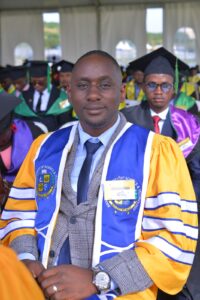
Research Title: “A MODEL FOR ENHANCING SECURITY IN A BRING YOUR OWN DEVICE ENVIRONMENTS”
Results:
Richard has developed a model to promote the secure adoption and usage of personal mobile devices, such as smartphones, within a corporate setting. His research uncovered that data breaches and misuse within organizations were primarily caused by users’ inadequate knowledge and experience in managing controls. Additionally, organizations lacked policies that specifically addressed the use of personal mobile devices for work-related tasks.
Richard’s model offers stakeholders essential security considerations to ensure the secure utilization of personal mobile devices in corporate environments. These considerations encompass key policy requirements, security controls, human resource training, application vetting, as well as storage and updating practices.
Supervisors:
- Assoc Prof. Annabella Habinka
- Dr. Fred Kaggwa of MUST
Funder: MUST and self sponsorship
Daniel Muhanguzi
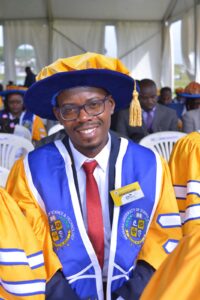
Topic: A Collaborative Knowledge Management Framework for Enhancing Value of Agricultural Information in Smallholder Farming Systems
Abstract
Information plays a key role in a smallholder farmer’s life. It enhances their knowledge and strengthens their decision-making ability which translates to productivity and profitability. Smallholder farmers receive agricultural information from family and friends, extension agents, research institutions, middlemen, and input dealers among others. With the ubiquity of ICTs especially mobile phones and the internet, smallholder farmers are increasingly adopting and subscribing to services that provide them with market, weather, and agronomic information.
However, different sources use different channels and the information provided is not well processed and aggregated for sufficient utilization by smallholder farmers. This is exacerbated by the variability in human capital and minimal formal methods to manage the information and knowledge smallholder farmers receive.
Furthermore, there is inappropriate and insufficient local content and also poor information/knowledge-sharing culture which affects the smallholder farmers’ ability to extract value from the agricultural information. These challenges are further compounded by the lack of a suitable and reliable framework that can be leveraged to enhance smallholder farmers’ ability to extract value from agricultural information.
Results: A collaborative knowledge management framework that enhances smallholder farmers’ ability to extract value from agricultural information.
Supervisor:
- Dr. John Ngubiri – Mak,
2. Dr. Kawuma Simon – MUST
Funding: Self sponsorship
Tumuhimbise Wilson
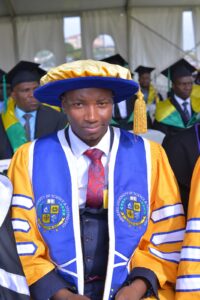
Title: A Mobile Health Framework for Public-Private Mix in Tuberculosis Prevention and Care in South Western Uganda
Results: Developed a mobile health framework to enhance the following up of presumptive TB patients referred from private to public hospitals.
Supervisors:
Dr Angella Musiimenta
Dr Fred Kaggwa
Dr Daniel Atwine
Funder: A Research Grant from the Eunice Kennedy Shriver National Institute of Child Health & Human Development of the National Institutes of Health under Award
Number R21HD107985.
NAKATO RUTH
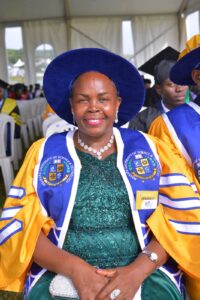
Research Title A MODEL FOR ASSESSING THE URBAN COMMERCIAL BANKS EMPLOYEES’ CYBER SECURITY ETHICAL BEHAVIOR IN UGANDA.
Results:
Ruth developed a model called an Employee Cyber security ethical behavior assessment model that enables a bank to assess its employees’ Cyber security ethical behavior.
Ruth’s research revealed that; Justice, Courage, Temperance, and ethical Climate are significant drivers of Cyber security ethical behavior in Ugandan commercial banks.
Ruth’s web-based model focuses on different specific modules like; The Application layer module, Network connection module, Storage Module, Question module, Marking and Scoring module, and Reporting, which is tailored for assessing Ugandan commercial banks’ employees’ cyber security ethical behavior.
Supervisors:
- Prof. MAYOKA. G. KITUYI of Makerere University business school
- DR. FRED KAGGWA of Mbarara University of science and Technology.
Funders.
Ruth received funding from African Development Bank Support to Higher Education, Science and Technology (HEST) Project, (AfDB-HEST).
Faculty of Business and Management Sciences
MARGARET NAMUBIRU
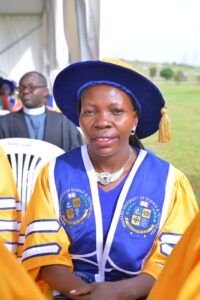
Topic: MARKET ACCESSIBILITY AND HOUSEHOLDS’ FOOD SECURITY IN ACHOLI SUB REGION-UGANDA
Supervisors
- NSAMBU KIJJAMBU FREDERICK
- NGAKA WILLY
- SPONSORED BY ADB
NIMUSIMA PEREEZ
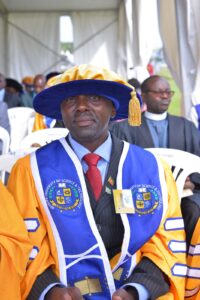
Topic: INTERACTIVE MARKETING PRACTICES AND MARKET PERFORMANCE OF SOFT DRINK MANUFACTURING ENTERPRISES IN KIGALI CITY-RWANDA
Supervisors
- PROF. KAMUKAMA NIXON (PH.D.)
- KALIBWANI REBECCA (PH.D.)
Funding: SELF SPONSORED

